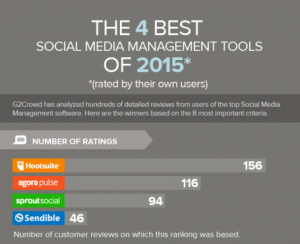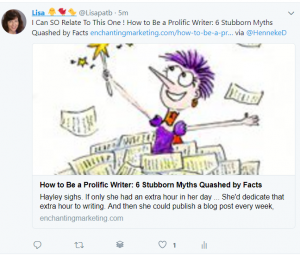 (April 01, 2015) I was checking my personal Facebook profile (don’t tune out yet) when I noticed a ‘sponsored post’ from HubSpot. They were offering a downloadable resource for those who want to write better. The resource is titled (see image) “The Marketers’ Guide to Writing Good Well” … the ‘good’ replaced by ‘well.’
(April 01, 2015) I was checking my personal Facebook profile (don’t tune out yet) when I noticed a ‘sponsored post’ from HubSpot. They were offering a downloadable resource for those who want to write better. The resource is titled (see image) “The Marketers’ Guide to Writing Good Well” … the ‘good’ replaced by ‘well.’
The image that appeared with the sponsored post wasn’t the image of the book, but rather someone typing on a keyboard and the wording for the title was showing “writing good” rather than “writing well” … the person creating the post missed this. Anyone who clicked the link would have known right away that someone had goofed when putting together the post. (Stuff happens!)
But, I was appalled to see the number of people who decided to take this as an opportunity to slam the post and HubSpot in rather nasty ways. Rude comments about their writing skills, etcetera etcetera. (The post may have been removed by the time you see this … I couldn’t find the post when I checked back later.)
Are You Afraid to Dive Into Social Media?
Unfortunately, this type of post, with nasty comments, is one of the reasons some businesses are afraid to dive into social media. They’re concerned about the types of things people may write about them online.
The reality is that there is always the risk of one or more people occasionally writing rude, and sometimes downright nasty, comments rather than helpful, even helpfully critical, comments on something you share online. This isn’t a common occurrence, and in fact you may never experience this. But sometimes, as in the case of the HubSpot post, a number of people wrote (what I consider to be) rude comments, rather than helpful criticism, on the post. HubSpot handled the nasty comments and the helpfully critical comments in a professional and respectful manner, not surprising. That’s the type of business they are.
However, as already noted, rude comments on a business social network, in my experience, are the exception rather than the rule.
Rude Comments and Respectful Criticism
Interestingly, when people make rude comments online, rather than respectful feedback or criticism, it says more about them than it does about the person or organization they are criticizing.
Most of us cringe (at least if you’re Canadian) at this kind of rudeness. We are comfortable with honest critiques that are shared in a gracious way, but rudeness often (hopefully usually) makes many of us feel uncomfortable, even embarrassed for the one being treated rudely (and even sometimes for the person being rude).
In fact, rudeness sometimes backfires and causes fans and followers to take the side of the person or business on the receiving end of the nastiness, assuming the comment is seen as unjust or unwarranted.
Handling Rude Comments and Respectful Criticism
Not to long ago I worked with a few political candidates who were running for public office. Two of them were active on Facebook and used promoted posts to help get the word out about their candidacy. For one of the candidates, someone they had known many years earlier through work wrote a negative comment about the experience they had with the candidate personally. In the case of the other candidate, someone respectfully disagreed with the candidate and called into question their beliefs.
Both scenarios had the potential to negatively impact their campaign if not handled well. Especially as the posts were being promoted to reach thousands of potential voters in the area where they were running for office.
In both scenarios it would have been easy (and foolish) to become defensive, or justify deleting the person’s comment. While both comments could be seen as negative or critical neither warranted being deleted from their profile. In both cases, the candidates were advised to leave the comment in place and respond briefly but graciously. In other words, to take the high road. The comments weren’t responded to with any kind of justification, but they were graciously acknowledged.
Both candidates won their seats, and were the only two newly seated candidates in the campaign they were running in.
The way they handled these comments wasn’t responsible for their winning the election. However, if they had responded in anger, in defensiveness or just plain poorly, it is possible the election results might have been different. Instead, the thousands of people who saw their ad, assuming they even took the time to read the comments, would have seen a gracious response to a difficult comment.
When To Remove a Comment
There are times where removing a comment is the right thing to do. Where the language is inappropriate (swearing, racist, vulgar, etc.), or where it is excessively rude and belligerent.
The Opportunity In Difficult Situations
However, in most cases, a negative comment, like a complaint about our product or our service, may actually be an opportunity for our business.
An opportunity to show/prove to the individual customer (and a wider group of people, including existing and potential customers, who may be watching), that we stand behind our products and our services. That we value our customers and what they have to say.
When handled well, complaints are often a great opportunity to strengthen customer loyalty.
Anyone running a business will occasionally come up against difficult situations that need handling. Often these situation can be resolved, when handled with a strong customer service-relationship mindset, in a way that strengthens the business-customer bond.
And occasionally, people (and customers) can be nasty. But most people, when treated right (and sometimes when not treated right), aren’t!
(203)









